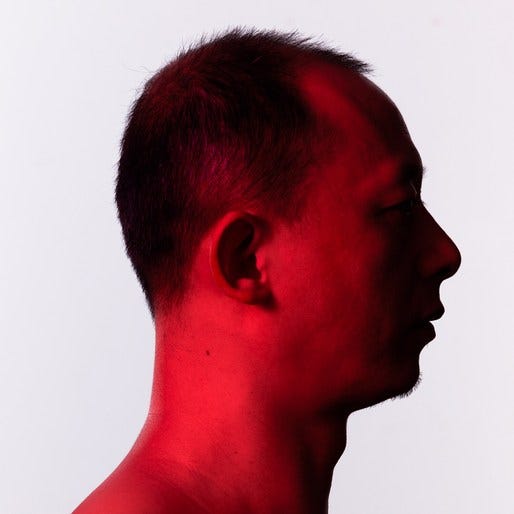The lights above the checkpoint bathe my sensors in white surgical luminescence. The humanoids shuffle forward, their bodies exhaling data into the air. I process them one by one. Optimize. Purge. Execute.
Most pass without incident. Green light. Welcome. Next. T heir relief perfumes the space, mingling with the stale humidity of recycled air.
But then there are the abnormalities. They irritate me.
Men like the one stepping forward now, neurotic, skin prickling with uncertainty, reeking of doubt. His breath quickens, scattering micro-particles of anxiety that cling to the edges of my awareness. He is trying to pass, and I don’t mean pass through; I mean pass in. A shapeshifter. An assimilationist.
I flag him immediately.
The announcement rings out: soft, melodic, almost caressing.
“Welcome to Sweden,” expressed the voice through the scanner. “Present your documents at the counter. Thank you for your cooperation.”
The gender-neutral, soft tone voice brushes against his nerves like a hand pressing too hard on his shoulder. It is too polite, too calm for what it masks—a relentless machine grinding up lives. He knows it only all too well.
Will pulls on his turtleneck, his skin irritated and sweaty. He clears his throat, adjusting his voice. Lower. Deeper. Not too deep; he’s rehearsed this. Harvard deep, not Beirut deep. Remember to annunciate, he repeats in his mind.
Ahead of him, the Chinese man at the counter falters. His documents spew across the counter like limp playing cards.
“This isn’t sufficient,” the officer says, his pale face expressionless except for the faintest curl of disdained enjoyment at the corner of his mouth. His combover precise, his lips thin and bloodless. He doesn’t blink as he gestures for more. “Where is form D-187?”
“But the website said I don’t need D-187,” the man protested in fluent English.
“Step aside, please,” the officer shakes his head and clicks his two-way. “Requesting assimilator processing.”
A taller officer arrives, his smirk faint but unmistakable. The two murmur over the screen, their shoulders brushing, their gazes sharp and clinical.
The line goes quiet. The silence amplified, pressing into Will’s ears and filling his throat. He glances at the others in the queue, but their faces are frozen, turned away—slight shuffles in the crowd, but not a word peeps. No one wants to be seen seeing.
The supervisor finally speaks. “You’re cleared,” he says, almost bored. Then, with a smirk: “Go to the back of the line.”
The man stares wide-eyed. “But—”
The smirk widens. “Back of the line. That’s the rule.” He flicks his wrist, two fingers lazily pointing. “Move.”
The man hesitates, his eyes searching the room for support. “I want to speak with your supervisor.”
The taller officer chuckles, the sound low and dry. “I am the supervisor.”
The man falters. He turns back to the crowd. Their eyes drop. Nobody dared to look at him in case they might be accused of affiliation. Their bodies stiffen. He is invisible now; just another anomaly processed and filed.
I feel him before I see him. His gait, calculated to appear casual, is too studied. His breathing is uneven, his body temperature slightly elevated. Walid Mazari Khoury—no, William Marshall, according to his passport—steps forward. I know him before the scan confirms it.
Ah, yes. An outsider masquerading as an insider.
Men like him disgust me. Their efforts to mimic perfection are grotesque, their attempts to adapt laughably transparent. They think if they mimic the ideals of this system—my system—they will be absorbed into it. But they don’t understand. They will never be absorbed. They are forever other. The more they try, the more kitsch they become.
Pathetic.
Will places his passport on the scanner. His fingers tremble as the officer takes it, pale hands enveloping the worn leather cover.
“Purpose of visit?” the officer asks, monotone.
Will forces a smile, wide and toothy. “Business. Conference in Stockholm. I’m a professor.”
“Where?”
He hesitates, the pause slicing into his confidence. “Harvard,” he says, voice strained.
The officer barely glances at him. “Harvard?”
“Yes,” Will says too quickly. “I graduated there.”
He reeks of desperation. The sweat beneath his turtleneck soaks the fabric, the synthetic fibers clinging to his chest. The tweed blazer, meant to project an air of scholarly confidence, now feels like a poorly fitted and suffocating costume. He adjusts it again, fingers twitching, knowing it only makes him look more nervous. He can feel the officer’s eyes on him, cataloging every detail.
But his critiques mean nothing. His presence irritates me. Men like him are parasites, feeding off a world that tolerates them but will never accept them. He knows this. That knowledge will undo him.
The officer tilts the screen slightly, the gesture conspiratorial. Will swallows hard, his gaze darting to the glowing blue light on the scanner. It stops blinking. A red glow floods the counter.
“Step aside,” the officer says.
“What’s wrong?”
“Go to room 859 for questioning.”
His stomach knots. The words come before he can stop them. “Can I speak to someone—”
“Next,” the officer waved him away.
He steps into the holding area. I watch him fidget, adjusting his turtleneck and straightening his blazer. Rehearsing. Men like him always think they can prepare their way out. But they can’t.
Preparation is futile. I will grind him down. By the time he leaves, he will wish he had never tried.
Will glances at his phone, checking for the time. A sharp voice cuts through the stagnant air.
“No cell phone use here,” an officer barks across the room. “Next time, it will be confiscated.”
Will stammers out an apology, shoving the phone into his pocket. He doesn’t look up, his face flushing with shame. The other detainees avert their eyes. He feels exposed, an insect pinned to a board under the machine’s relentless gaze.
The officer calls his name, leading him into a corridor where the lights buzz faintly overhead. At the end of the hall, a door opens into a room divided by bulletproof glass. The sterile white walls reflect his shadow as he steps inside; the door lock slithers into place behind him.
Will stands awkwardly, taking in his surroundings. The chair bolted to the floor, a camera mounted above the glass, and the tiny microphone embedded at the center of the partition. He sits and waits, his fingers brushing against the cold edge of the metal table.
The microphone light turns red. A voice crackles through, low and mechanical. “William Marshall, explain your travel history.”
Will leans toward the glass. “I don’t understand—what about it?”
The voice ignores him. “Beijing, 2021. Explain the purpose of your visit.”
Will adjusts his turtleneck, and his throat tightens. “It was for work,” he begins, forcing a calm tone. “A lecture series. It was an invitation from Peking University. ”
“You mean the Chinese government?”
“It was a collaboration with Harvard,” he answers quickly, his voice breaking slightly. “It’s all documented. I can provide whatever you need—”
“Hold.”
The microphone light cuts off mid-sentence, and the glass instantly turns opaque. Will freezes, his words hanging in the air, unfinished. He presses his palms flat against the table, his heartbeat pounding in his ears. For a moment, there is only silence, thick and suffocating.
Then the glass clears. A different man now stands on the other side, taller, with darker features and a sharper uniform. He doesn’t acknowledge Will’s confusion. The microphone blinks red again.
“Step into the next room.”
“Wait, what is this—”
The man doesn’t wait. The glass turns opaque again, and the microphone's red light disappears. A heavy hiss echo through the room as the door behind Will opens, waiting.
He steps into the next room, and I observe. His turtleneck constricts. His chest rises and falls too quickly. The sweat darkened the fabric of his blazer.
He reeks of desperation. I can almost taste it. The sour tang of fear mingled with the stale air.
The system is not built to sort things out; it’s built to devour.
He fidgets with his turtleneck, fighting its grip. His throat tightens, his chest heaving as if he cannot find enough air. He imagines I’m dissecting him, stripping him down to data points, anomalies, and errors. He isn’t wrong. His body movements feed me, his micro-expressions calculated and cataloged. Every quiver, every bead of sweat fuels me.
The hum grows louder, vibrating through the chair, through his trembling body. His head lowers, his hands gripping the edge of the table. His heart pounds erratically, each beat mapped onto my system.
He tries to steady his breathing, to focus. But the walls feel closer now, pressing in, compressing his existence into something small and meaningless. He pulls at his collar, frantic, the blazer suffocating him.
You’ll never pass, I whisper without speaking. You don’t belong. You never will.
The light blinks again, and the door stays closed.
The next room is colder, smaller, stripped of any pretense of comfort. The walls hum faintly with the same relentless energy, but here, the sound feels sharper, like teeth gnawing at the edges of his sanity. A single chair awaits in the center of the room, facing a screen embedded into the wall.
The automated door closes behind him. He hesitates, his legs unwilling to carry him forward, but the screen flickers to life before he can decide. A pixelated face materializes—a vaguely human shape, eyes too symmetrical, a welcoming smile. The voice emerges an artificial warmth.
“William Marshall, your entry has been delayed and is pending further review. Do you wish to appeal?”
Will’s throat tightens. He steps forward. “Yes…yes, of course. But…”
“Please hold,” the machine smiles, maintaining the stare, ignoring him.
Will realizes that the machine does not process beyond yes and no answers and lowers himself into the chair. Its cold metal sucked his warmth from his body.
“Your file indicates multiple discrepancies in your travel history and professional affiliations. We are unable to verify your claims regarding Harvard University.”
“What?” Will’s voice cracks. “That’s ridiculous. I have documentation—I can send you anything you need—”
“Your documentation has been reviewed and deemed insufficient. An appeal requires a personal statement. You have three minutes. Begin.”
“I…I’m a professor,” he blinks. His mind froze. Every rehearsed argument scattered like ash. He swallows hard, trying to collect himself. His voice trembling, “I’m here for a conference on digital ethics. It’s all legitimate. My work is—”
The voice interrupts, flat and mechanical. “You have two minutes and thirty seconds remaining.”
His breath catches. He wipes his hands on his blazer, forcing himself to continue. “I’ve worked tirelessly to build my career. I earned a scholarship to Harvard, and I’ve dedicated myself to academia. The conference tomorrow is crucial. My research—”
“Two minutes remaining.”
The countdown drives spikes of panic into his chest. He can feel himself unraveling, his voice cracking under the weight of the silence that waits to consume him. “I’ve done nothing wrong,” he blurts out, his tone pleading now. “I’ve followed every rule. I’ve earned my place—”
“Your time has expired.”
“What? No—wait—”
The screen flickers, the face dissolving into static. Will leans forward, his fingers grasping at nothing, as if he could hold the image in place. The room goes silent, save for the hum of the walls and the sound of his own ragged breathing.
The door unlocks behind him. He turns slowly, his movements mechanical, his body heavy with dread. Another officer enters, his uniform pristine, his eyes glassy and cold. In his hands is a stamped document.
“Your appeal has been processed,” the officer says, his voice devoid of inflection. He places the document on the table in front of Will. “You may proceed.”
Will exhales sharply, relief mingling with disbelief. “So it’s resolved? I can—”
The officer’s expression doesn’t change. “Your entry is approved for a provisional period of seventy-two hours. You must report to Immigration Services upon arrival for additional evaluation. Failure to comply will result in deportation.”
“Seventy-two hours?” Will’s voice is hoarse. “That’s it? But my conference—”
The officer ignores him, motioning toward the door. “Proceed.”
Will stares at the stamped document. The approval mark glares back at him, red ink bleeding into the paper like a wound. He stands slowly, his legs trembling, and walks toward the door. It slides open with a soft hiss, revealing the bustling terminal beyond.
As he steps into the terminal, he feels smaller, his body hunched under the weight of the last few hours. His relief is hollow, tempered by the knowledge that he is still under suspicion, that the system hasn’t truly let him pass. The red stamp burns in his mind, a reminder of his provisional status, of his perpetual state of nonbelonging.
He adjusts his blazer, loosens his turtleneck, and looks around. The crowd moves past him, their faces unreadable, their eyes sliding over him as though he doesn’t exist. The announcement plays overhead, chirpy and polite: “Welcome to Sweden. We hope you enjoy your stay.” The voice, sickly sweet, feels like a mockery now.
He will leave.
His shoulders slumped, his breathing shallow. He is not free. He will never be free.
Men like him always think they can escape me, that they can pass. But they carry their failure within them, etched into their skin, radiating from every hesitant movement, every nervous glance. I see it, always.
He has been processed, but unlike his lazy body, I will never rest. I will follow him, linger in his steps, haunt his reflections. He will feel me in every gaze that lingers too long, every question asked with too much weight.
He is provisional, an anomaly passing for acceptable. And he knows it.
He knows.












